With Greta Thunberg now a household name, there’s no question that Canadians are finally waking up to climate change. Her recent Canadian visit sparked marches and protests across the country.
Now, CBC News reports that the implications of climate change for the housing market might be astronomical. That’s because insurance companies are barely able to keep up with claims related to weather damage.
READ: What To Do If Your Home Floods And How To Prevent Flooding In Your Basement
For consumers, that means paying out maximum premiums even if your house was spared by disaster. And it’s happening in every province. This past May, Ontario’s heavy rainfall poured down onto Bracebridge, a city already overwhelmed by floodwaters. In fact, the flood zones stretched across Ontario and even into Quebec. Meanwhile, the wildfires in British Columbia have gotten so extreme that there’s even a map that continually updates their progress.
It’s a foreshadowing of what we can expect on both a local and global level. Just days ago, Forbes showed a new map predicting sea levels and the cities that would be eaten up by water by the year 2050.
Now Ontario residents are struggling to make sense of the increases. There's been an increase of complaints, says Pete Karageorgos, the director of consumer and industry relations for Ontario with the Insurance Bureau of Canada. There’s anger, resentment, fear of the future and no one really knows the extent of the damage that climate change will bring.
READ: Here’s What Downtown Toronto’s New Island Will Look Like
Some condos in the Toronto downtown core have even spiked between 10 and 40 per cent, despite never having a claim. People like Ryan Davey, president of a condo corporation near Liberty Village, have been affected and hit with a 40 per cent increase.
"I think the reason we got was that it was due to higher payouts due to natural disasters and large rates of claims across the country," said Davey.
According to a recent report from the Insurance Bureau of Canada (IBC), insured damage for floods, windstorms, ice storms and tornadoes reached $1.9 billion in 2018. And climate change is clearly the accepted caused across the board.
Natural disasters are a big part of it, says insurance broker Nazim Charania, but claims are also much higher now because of how people are living.
READ: Toronto Will Fast-Track $2.5B Project To Improve Beach Water Quality
"Now, more people are renovating and living in basements," said Charania, a veteran insurance worker.
"Years ago, we didn't have so many people with finished basements; they just lived upstairs and basements were open rooms used for storage. Now when basements flood, entire homes are lost."
And it’s not just waterfront properties that are experiencing the damage. In 2018, strong showers and backed up sewers caused flooding not just near the waterfront, but also in High Park and North York.
"We've had severe flooding for years," said Frances Nunziata, Toronto city councillor for Ward 5 York South-Weston. "We have funding in the budget to do the infrastructure work but we're now waiting for an environmental assessment [from the province]."
But despite the hikes, experts encourage people to stick with their original insurance providers – even if you can save upwards of $20 a month. Customer loyalty discounts might actually be worth something in the age of climate change.





















